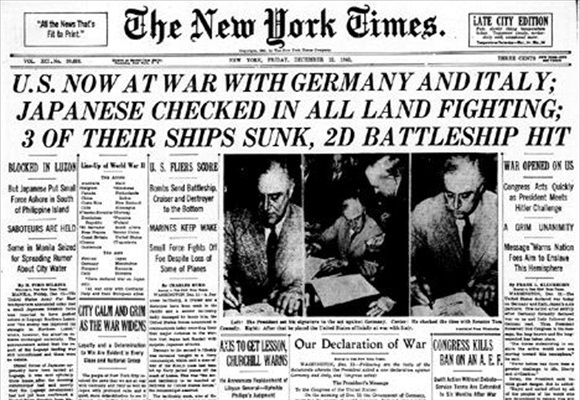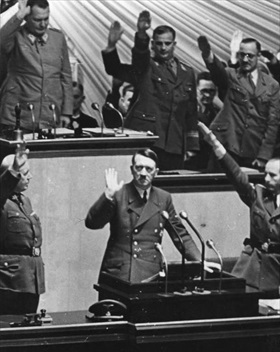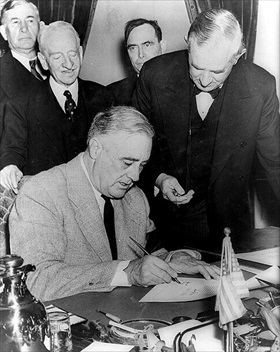GERMANY, ITALY DECLARE WAR ON U.S.
Berlin, Germany · December 11, 1941
On this date in 1941 in Berlin, Adolf Hitler, Chancellor and Fuehrer of Nazi Germany, addressed a toothless Reichstag (German parliament), its members eager to hear him declare war on America. Hitler did this four days after the Japanese attack on the U.S. Pacific Fleet at Pearl Harbor, Hawaii, without technically being forced or even obligated by treaty to do so. (A new tripartite treaty was being readied that would have obligated Axis treaty partners Germany and Italy to become involved in hostilities against the United States should war break out between Japan and the U.S., but it was unsigned.)
Hitler expressed surprise and initial incredulity when he learned of the attack on Pearl Harbor, though he long expected that Japan would be forced to act against the United States if it was serious about claiming world-power status. Pressured by the Japanese ambassador in Berlin to declare war on the U.S. sooner than later, Hitler’s gesture of solidarity with a country halfway around the world seemed absurd and unnecessary, but it was, Hitler told his foreign minister, Joachim von Ribbentrop, the “politically correct” thing to do. An added benefit to the U.S.‑Japanese war, Hitler told his propaganda minister, Joseph Goebbels, was that the U.S. would be less likely to provide aircraft and weapons and convoy support and ships to the British, with whom Germany had been at war since September 1939, because “it can be presumed that they will need all that for their own war with Japan.”
At this point in time, though, the Luftwaffe’s air battle against Britain was lost, the blitzkrieg on Germany’s Eastern Front (Operation Barbarossa) had failed with a loss of over 750,000 men to the participating Axis powers, and the Italian venture in North Africa by Hitler’s Axis partner Benito Mussolini needed all the support Gen. Erwin Rommel’s German Afrika Korps could provide. Now before insanely cheering deputies of the sham Reichstag Hitler screamed insults, often bizarre ones, at his new enemy, President Franklin D. Roosevelt, “that man who, while our soldiers are fighting in snow and ice . . . likes to make his chats from the fireside, the man who is the main culprit in this war.” No doubt British Prime Minister Winston Churchill was as surprised as Roosevelt was that the Fuehrer’s favorite bête noire had shifted from the stubborn British bulldog to the determined American eagle.
![]()
Germany and the U.S. Declare War on Each Other, December 11, 1941
 |
Above: Headlines in the late edition of the New York Times, December 11, 1941. Earlier in the day the U.S. Senate and House of Representatives passed a unanimous declaration of war on Germany and Italy, only hours after Hitler had declared war on the U.S. and three days after Congress had declared war on Japan.
 |  |
Left: Hitler receiving the endorsement of the Reichstag on December 11, 1941, after declaring war on the United States. Full of optimism and confident of victory, Hitler told Reichstag deputies that Germany, Italy, and Japan had concluded an agreement to “wage the common war forced upon them by the U.S.A. and England with all the means of power at their disposal, to a victorious conclusion [and pledged] . . . not to conclude an armistice or peace with the U.S.A. or with England without complete mutual understanding.” Less than four years later both Germany and Japan were compelled to sign separate unconditional surrenders by their enemies on May 7–8 (Germany) and September 2 (Japan), 1945.
![]()
Right: President Roosevelt signing the declaration of war against Germany. Texas Senator Tom Connally stands to the left of the president, holding a pocket watch to fix the exact time of the signing—3:05 p.m. EST. One minute later Roosevelt signed the declaration of war against Italy. In so doing the U.S. joined a war that threatened the survival of peoples and nations in Europe, North Africa, and the Far East. Six months later, on June 5, 1942, Congress declared war on Germany’s and Italy’s Axis partners, Romania, Hungary, and Bulgaria. Not until February 10, 1947, were peace treaties concluded between the victorious Allies and Italy, Finland, and the Soviet Union’s East European satellite countries of Romania, Hungary, and Bulgaria.
Adolf Hitler Declares War on the United States and the Lead-Up to World War II
![]()

 History buffs, there is good news! The Daily Chronicles of World War II is now available as an ebook for $4.99 on Amazon.com. Containing a year’s worth of dated entries from this website, the ebook brings the story of this tumultuous era to life in a compelling, authoritative, and succinct manner. Featuring inventive navigation aids, the ebook enables readers to instantly move forward or backward by month and date to different dated entries. Simple and elegant! Click
History buffs, there is good news! The Daily Chronicles of World War II is now available as an ebook for $4.99 on Amazon.com. Containing a year’s worth of dated entries from this website, the ebook brings the story of this tumultuous era to life in a compelling, authoritative, and succinct manner. Featuring inventive navigation aids, the ebook enables readers to instantly move forward or backward by month and date to different dated entries. Simple and elegant! Click 











